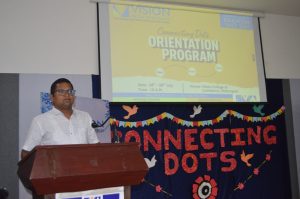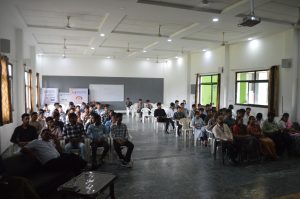Article by S.C.Pareek , CMO & Training placement Cell

Prof. Rajendra Aaseri was guest on honor on occasion of BCA students orientation program at Vision for session 2025-26 . He delivered two hours session on IT future . The glimpses of his address is as here .
In the past few decades, Information Technology (IT) has transformed the way we live, work, and communicate. From the early days of basic computing to the interconnected digital ecosystems of today, IT has been a driving force behind economic growth, innovation, and societal change. As technology continues to advance at an unprecedented pace, its future promises even greater transformation—powered by emerging trends such as Artificial Intelligence (AI), Cloud Computing, Cybersecurity, and Data Science. Understanding these trends is essential for individuals, businesses, and governments to adapt and thrive in the years ahead.
The Role of Information Technology Today
 Information Technology encompasses the use of computers, networks, storage systems, and software to process, store, transmit, and secure data. Today, IT underpins almost every sector—healthcare, education, finance, manufacturing, transportation, entertainment, and government services. It enables real-time communication, global collaboration, online commerce, remote working, and automated operations.
Information Technology encompasses the use of computers, networks, storage systems, and software to process, store, transmit, and secure data. Today, IT underpins almost every sector—healthcare, education, finance, manufacturing, transportation, entertainment, and government services. It enables real-time communication, global collaboration, online commerce, remote working, and automated operations.
The rise of mobile devices, the internet, and broadband connectivity has made IT an everyday necessity. Organizations rely on IT infrastructure to improve efficiency, make data-driven decisions, and deliver better services to customers. For individuals, IT offers access to knowledge, online services, and opportunities that were unimaginable a generation ago.
Emerging Trends Shaping the Future of IT
- Artificial Intelligence (AI)
AI is no longer just a concept from science fiction—it is a reality shaping industries and daily life. AI refers to the simulation of human intelligence in machines that can learn, reason, and make decisions. Machine Learning (ML), a subset of AI, allows systems to improve their performance over time without being explicitly programmed.
Applications of AI are diverse: virtual assistants like Siri and Alexa, recommendation engines on e-commerce platforms, autonomous vehicles, fraud detection systems in banking, and advanced medical diagnostics. In the future, AI is expected to enable even more personalized services, improve automation, and solve complex problems in areas like climate modeling and drug discovery.
However, AI’s growth raises important questions about ethics, bias, and job displacement. Addressing these issues will be crucial to ensuring that AI benefits society as a whole.
- Cloud Computing
Cloud computing has revolutionized the way organizations store and manage data. Instead of maintaining expensive on-premises servers, companies can now use cloud services to access computing power, storage, and software over the internet. This model offers flexibility, scalability, and cost savings.
The major cloud providers—such as Amazon Web Services (AWS), Microsoft Azure, and Google Cloud—are continuously expanding their offerings, from Infrastructure-as-a-Service (IaaS) to Platform-as-a-Service (PaaS) and Software-as-a-Service (SaaS). The future will likely see an increased adoption of hybrid and multi-cloud strategies, where businesses use a combination of public and private clouds to balance performance, security, and compliance.
Cloud computing will also enable greater collaboration, remote work opportunities, and access to cutting-edge technologies like AI and big data analytics without heavy upfront investment.
- Cybersecurity
As our dependence on digital systems grows, so does the threat landscape. Cybersecurity has become one of the most critical areas in IT. Cyberattacks—ranging from phishing scams and ransomware to large-scale data breaches—can disrupt businesses, compromise sensitive information, and even threaten national security.
The future of cybersecurity will involve more advanced defense systems powered by AI, real-time threat detection, and stronger encryption technologies. Cybersecurity awareness and training will also be essential, as human error remains a significant vulnerability.
Governments and organizations are expected to invest heavily in security frameworks, regulations, and global cooperation to protect digital infrastructure from increasingly sophisticated attacks.
- Data Science and Big Data
Data has often been called the “new oil” because of its value in driving innovation and decision-making. Data Science involves collecting, processing, and analyzing large volumes of structured and unstructured data to extract meaningful insights.
In business, data science enables predictive analytics, customer segmentation, and operational optimization. In healthcare, it helps with disease prediction and personalized treatments. In urban planning, it aids in designing smarter cities.
The future will see even larger datasets from the Internet of Things (IoT), social media, and sensors. Advanced analytics, coupled with AI, will make data-driven decision-making faster and more accurate. However, managing data privacy, security, and ethical use will be a major challenge.
Other Key Developments in IT’s Future
While AI, cloud computing, cybersecurity, and data science are at the forefront, other emerging technologies will also play a vital role in the future of IT:
- Internet of Things (IoT): Billions of connected devices will collect and share data, enabling smarter homes, factories, and cities.
- Blockchain Technology: Beyond cryptocurrencies, blockchain offers secure, transparent, and tamper-proof recordkeeping for supply chains, voting systems, and contracts.
- 5G and Beyond: Faster and more reliable networks will support advanced applications like augmented reality (AR), virtual reality (VR), and autonomous vehicles.
- Quantum Computing: Still in its early stages, quantum computing promises to solve problems that are impossible for classical computers.
Challenges and Considerations
The future of IT also comes with challenges:
- Ethical Issues: Ensuring fairness, transparency, and accountability in AI systems.
- Digital Divide: Bridging the gap between those with access to technology and those without.
- Environmental Impact: Reducing the carbon footprint of data centers and electronic waste.
- Regulation and Privacy: Protecting individual rights while enabling innovation.
Addressing these challenges will require collaboration between governments, businesses, technologists, and communities.
Conclusion
Information Technology is a dynamic and ever-evolving field that shapes the way we live and work. The coming years will see revolutionary changes driven by artificial intelligence, cloud computing, cybersecurity advancements, and the expanding capabilities of data science. While these technologies promise immense benefits—from efficiency and convenience to breakthroughs in science and healthcare—they also require careful management of ethical, social, and security concerns.
For individuals, staying informed and developing relevant digital skills will be crucial to thriving in the IT-driven future. For organizations, embracing innovation while ensuring security and responsibility will be the key to success. The journey ahead for IT is both exciting and challenging, but with thoughtful direction, it can lead to a more connected, efficient, and equitable world.

good one
https://shorturl.fm/1gSrV
https://shorturl.fm/qlu4Q
https://shorturl.fm/D4ocu
https://shorturl.fm/1oJFv
https://shorturl.fm/KDjNI
https://shorturl.fm/WGS1x
https://shorturl.fm/cP6P7
https://shorturl.fm/ToNYz
https://shorturl.fm/EFXep
https://shorturl.fm/cLGrQ
https://shorturl.fm/2ulY0
https://shorturl.fm/Ih995
https://shorturl.fm/UI9Fg
https://shorturl.fm/ew6qd
https://shorturl.fm/JVse0
https://shorturl.fm/9U2oM
https://shorturl.fm/1FLF8
https://shorturl.fm/KJg1S
https://shorturl.fm/joovt
https://shorturl.fm/0p1f7
https://shorturl.fm/ZyZkO
https://shorturl.fm/2DCUO
https://shorturl.fm/evCyK
https://shorturl.fm/JKyiM
https://shorturl.fm/Wd4iz
https://shorturl.fm/qrZKn